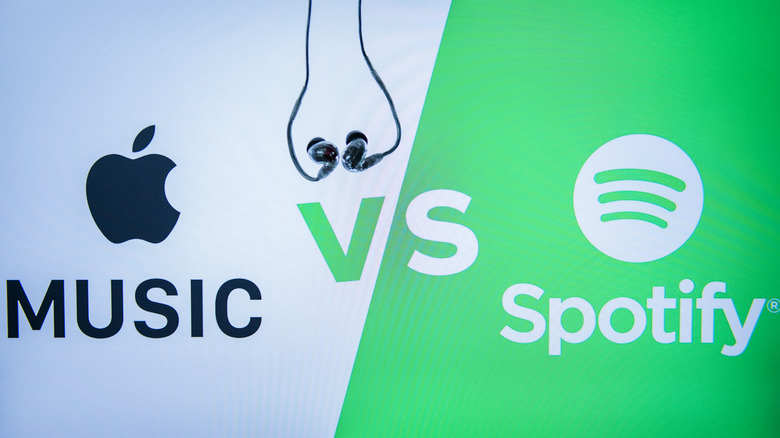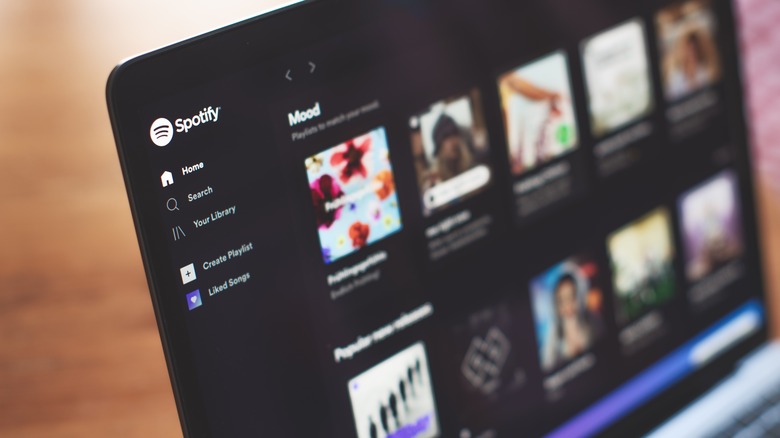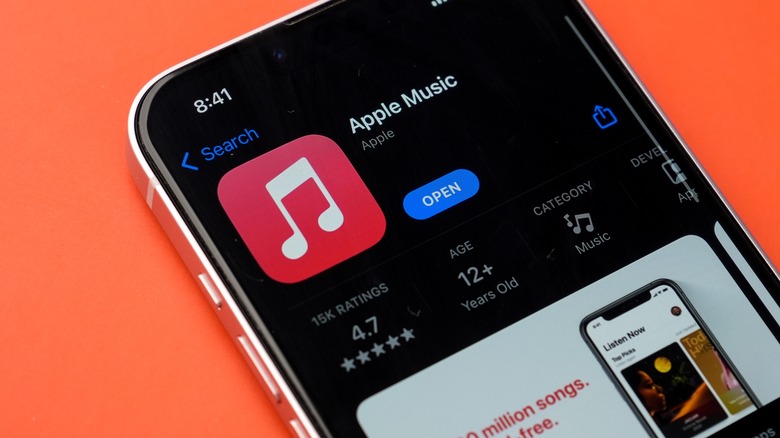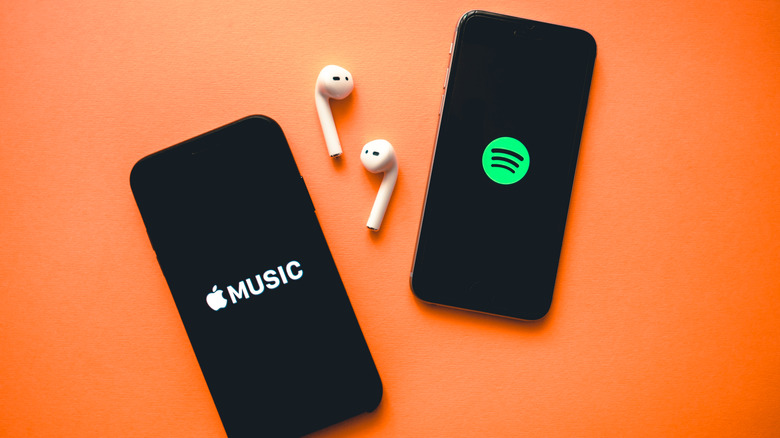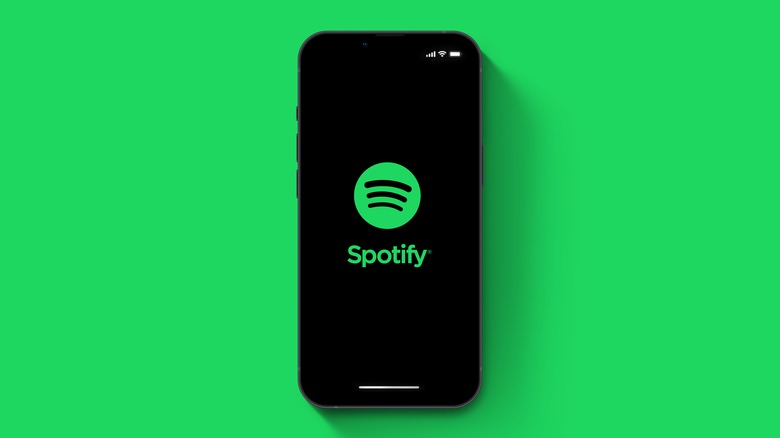Apple Music V. Spotify: Which Has The Better Sound Quality?
Spotify and Apple Music are the two titans of music streaming, with the former being by far the most popular. There are plenty of reasons to choose one or the other, but at their core, both offer access to a vast library of music. So, rather than getting bogged down in features and discovery algorithms, shouldn't the question be which one has the best audio quality?
Gone are the days of the iconic but terrible-sounding white iPod earbuds, and most people have at least one decent-sounding audio product. Maybe you're content with your AirPods, or maybe you're an audiophile who's invested thousands of dollars into your high-fidelity setup. In either case, you're probably looking to get the highest quality out of the music you stream.
I've been testing Spotify and Apple Music side-by-side for over a year, and when it comes to audio quality, there's a clear winner. If you're looking for a simple answer, Apple Music's crystal-clear audio offerings put Spotify's less-than-stellar sound to shame. But to explain why Apple Music's streaming quality eats Spotify for breakfast in terms of delivering high-resolution sound, there's a lot more nuance to unpack.
What is Spotify and does it have good audio quality?
If you listen to a lot of music, you already know Spotify is the most popular streaming service on the market. The Swedish company revolutionized the way we discover and consume music, emerging from a primordial soup of other competitors like Pandora and Rhapsody to become a household name. While its current competitors like Apple Music and Google's YouTube Music are tethered to companies whose primary revenue streams come from other products, Spotify is synonymous with the music business.
In addition to its wide catalog of songs, Spotify has also invested heavily in podcasts and is now expanding into audiobooks. But its biggest draw remains its recommendation algorithm. Spotify continues to build on its AI with products like the AI DJ, which gives users a never-ending radio station built for their interests. Spotify has also worked hard to make listening easy, as it's available on pretty much every platform you can think of, including Android, iOS, MacOS, Windows, PlayStation, Xbox, Roku, Google TV, and more.
When it comes to sound quality, though, Spotify is pretty bare-bones. On mobile, its audio quality tops out at 320kbits/s using a lossy Ogg Vorbis codec, which is roughly on par with CD quality. It's listenable but won't exactly pass muster for the audiophile crowd. On desktops, however, Spotify uses an AAC codec that tops out at what the company says is equivalent to 256kbits/s, at which point those with decent playback equipment will hear a noticeable lack of quality.
What is Apple Music and does it have good audio quality?
Apple has dominated digital music ever since iTunes put brick-and-mortar record shops out of business in the 2000s. In the era of streaming, the company offers Apple Music as a competitor to Spotify. While most of Apple's services are only available on Apple devices, Apple Music is available on Android, Windows, iOS, and MacOS.
Everything you'd expect of a modern streaming service is on offer, and Apple Music's features are well-rounded. Extensive algorithmically generated and curated playlists for music discovery abound, and while you won't find anything as technically advanced as Spotify's AI DJ, Apple Music makes up the difference with exclusive radio stations hosted by world-famous DJs like Zane Lowe and Ebro. On iOS, you can also access the Karaoke feature, which strips lyrics out of songs to let you shine as the lead vocalist.
With all other features being roughly equal to the competition, audio quality is where Apple Music shines. It has a robust library of lossless tracks that top out at a whopping 24-bit, 192kHz signal, which ironically surpasses the playback capabilities of Apple's own AirPods devices (via Apple). An Apple Music subscription also includes Dolby Atmos mixes for surround sound on many songs. To my ear, Apple's codecs sound better than Spotify's, with a much richer sound and better instrument separation, even when listening to songs that aren't delivered in a lossless format.
Apple Music trounces Spotify for sound quality
If you're looking for the best audio quality, there is no contest. Apple Music trounces Spotify without breaking a sweat thanks to its immense library of lossless, Hi-Res, spatial, and Dolby Atmos tracks. Meanwhile, even if you crank Spotify's quality settings to the limit, you're only getting the equivalent of 320kbit/s on mobile and 256kbit/s on the desktop app over a lossy Ogg Vorbis codec. Spotify has a lot of things going for it, but audiophile-grade audio isn't one of them.
Lossless streaming is included by default on Apple Music. After enabling it in the app's settings, you'll often see the lossless badge underneath the track timeline, indicating that the current song is being streamed at the highest quality available. Usually, that's the quality of the file that was submitted to the platform when the song was uploaded, so it's not always Hi-Res. But most tracks stream with at least 16 bits of depth over Apple's ALAC lossless codec, comparable to CD quality, while others reach 24 bits of depth, which is close to the upper limit of what top-of-the-line Bluetooth headphones can handle. And that's not counting Apple's spatial audio and Dolby Atmos library, which create a more realistic soundstage on supported playback devices.
It's worth noting that, if you have an iPhone, you ironically can't take advantage of the highest streaming quality Apple Music offers unless you have an external digital audio converter. That's because iOS does not support Hi-Res Bluetooth codecs like Sony's LDAC, which can deliver audio with a 32-bit resolution but is only available on Android. However, iOS users with capable headphones like the AirPods Max or Sony WH-1000XM5 will still be able to take advantage of most lossless tracks in the Apple Music library.
Spotify has been promising lossless streaming for years but hasn't delivered
Spotify's lack of lossless streaming is, at this point, getting a bit ridiculous. In a world where Apple Music, Tidal, Amazon Music, and other competing services all offer high-quality audio libraries, Spotify's lossy offerings feel more outdated than ever. As the most popular music streamer by a wide margin, one would think Spotify could easily deliver a feature its competitors already offer, but a proposed Hi-Fi tier has languished in development for years.
What's strange is that Spotify has been promising to launch a Hi-Fi subscription tier since February 2021. When it was first unveiled, Spotify claimed its higher quality audio service would launch later that same year, but 2022 arrived with nary a word from Big Green. In June 2023, Bloomberg reported that the high-fidelity plan was still in development and would be called "Supremium," but as the end of the year approaches, it still hasn't launched. The last buzz circulated about "Supremium" in September when a Reddit user discovered related code in the Spotify app. In response, Spotify told The Verge, "We don't comment on speculation around new features and do not have anything new to share at this time."
For now, Apple Music is the clear winner against Spotify in terms of sound quality. If Spotify's Hi-Fi tier ever makes it out of the gate, we'll be sure to revisit the comparison.
